The Complete Guide to Commercial Freezer Solutions
A three door freezer is a high-capacity commercial refrigeration unit featuring three separate compartments that maintains temperatures between -10°F and 0°F. These units are essential for foodservice operations requiring substantial frozen storage capacity.
Quick Three Door Freezer Overview:
- Capacity: Typically 72-80 cubic feet
- Dimensions: Approximately 82" W × 32" D × 80" H
- Temperature Range: -10°F to 0°F
- Door Types: Solid stainless steel or triple-pane glass
- Key Features: Bottom-mounted compressors, LED lighting, digital controls
- Price Range: $5,000-$12,000 new, $3,000-$6,000 refurbished
- Common Brands: True, Migali, Hoshizaki, Chef AAA, Maxx Cold
Three door freezers balance substantial storage capacity with a smaller footprint than walk-in units. These workhorses of commercial kitchens maintain consistent temperatures and energy efficiency.
I'm Mortuary Cooler, a national supplier of specialized refrigeration solutions with experience in commercial three door freezer applications across foodservice, retail, and mortuary settings.
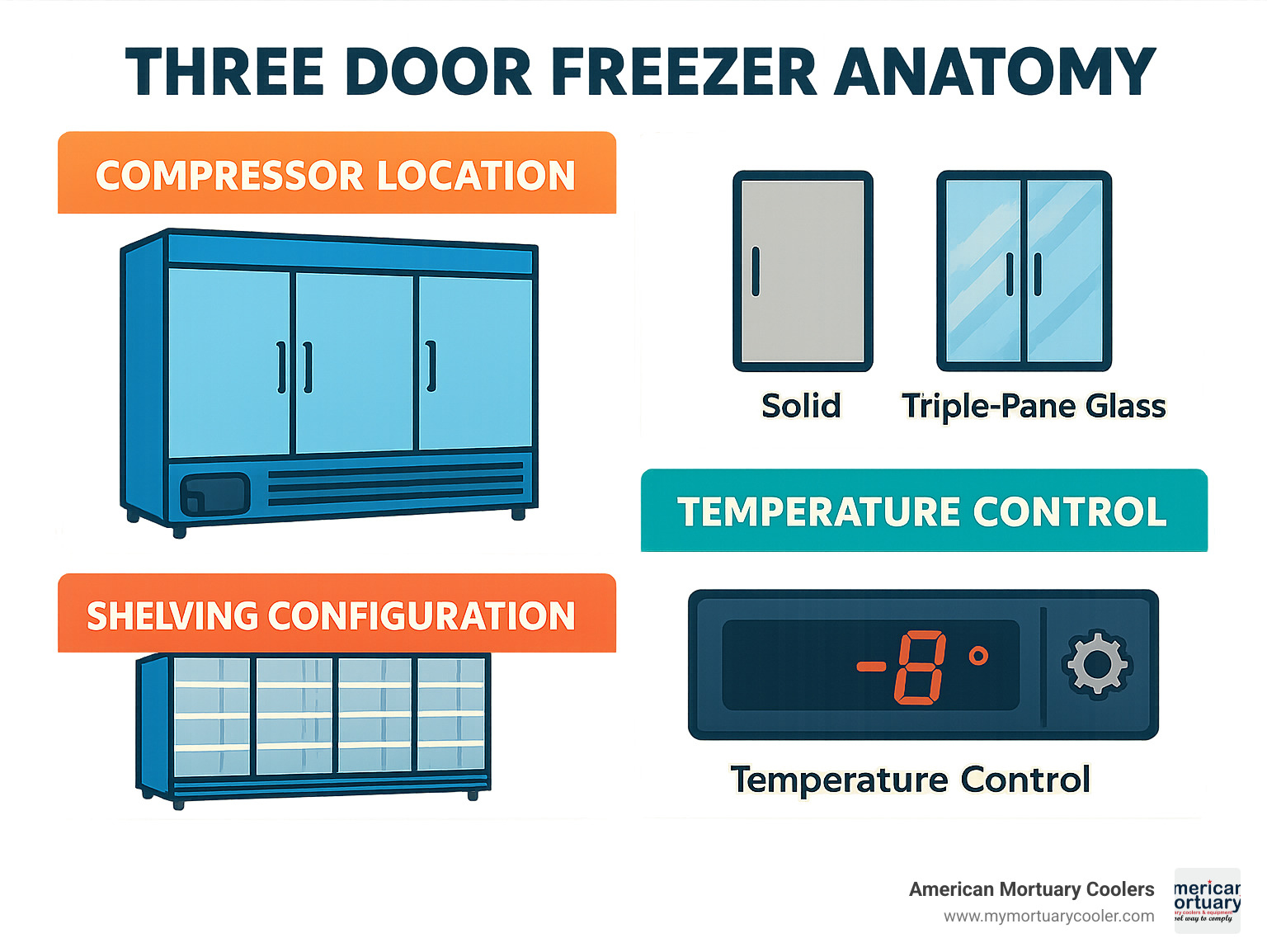
Explore more about three door freezer:
What Is a Three Door Freezer?
A three door freezer is your commercial kitchen's answer to substantial frozen storage needs. These units feature three separate compartment doors and maintain temperatures between -10°F and 0°F – perfect for keeping everything from ice cream to prepared meals at their optimal frozen state.
When exploring three door freezer options, you'll encounter two main varieties: reach-in models for back-of-house storage and merchandiser freezers with glass doors for customer-facing areas.
With 72-80 cubic feet of capacity, these units offer impressive storage without demanding the space or budget of a walk-in freezer. Most quality three door freezers feature bottom-mounted compressors for improved maintenance access and performance.
The door type is often the deciding factor:
- Solid stainless steel doors provide superior insulation and energy efficiency
- Triple-pane glass doors allow staff to locate items without opening the door
These versatile units represent the perfect middle ground between smaller two-door models and full walk-in freezers.
Main Commercial Applications of a Three Door Freezer
The substantial capacity of a three door freezer makes it indispensable across numerous commercial settings:
- Restaurants: Store frozen proteins, vegetables, and prepared items with organized compartments
- Bakeries: Preserve raw dough, flash-frozen pastries, and specialty items
- Grocery stores: Transform frozen storage into valuable merchandising space with glass-door models
- Institutional kitchens: Support high-volume food preparation in schools, hospitals, and cafeterias
- Mortuary facilities: Provide precise temperature control for specialized storage needs
- Food distribution: Serve as staging areas for frozen products awaiting delivery
Three Door Freezer vs Walk-In: Which Fits Your Operation?
Choosing between a three door freezer and a walk-in freezer comes down to balancing immediate needs with future growth.
Space considerations: A three door freezer requires about 7 feet of width and 3 feet of depth, plus clearance. Walk-ins demand dedicated floor space with proper flooring and ceiling clearance.
Mobility: Three door freezers come with casters for easy cleaning and reconfiguration. Walk-ins are permanent structures that cannot be moved without disassembly.
Cost comparison: A high-quality three door freezer typically ranges from $5,000-$12,000 new. Walk-in freezers start around $15,000 and can exceed $30,000, plus installation costs.
Installation timeline: Your three door freezer can be operational within days. Walk-ins require planning, permits, and construction that can stretch for weeks.
Capacity needs: While a three door freezer offers 72-80 cubic feet of storage, walk-ins start at about 100 cubic feet and can be built to almost any size.
For many operations, a three door freezer hits the sweet spot of substantial capacity without the commitment of a walk-in.
For more detailed information on walk-in options, see our Ultimate Guide to Walk-In Fridge and Freezer Combos.
Key Features & Brand Comparison for Three Door Freezers
Shopping for a three door freezer can feel overwhelming with so many options. Let's break down what matters and how top brands compare.
Must-Have Specs in Any Three Door Freezer
Before choosing a brand, ensure any three door freezer you consider has these essential features:
- Quality shelving: 9-12 adjustable shelves that can handle at least 120 pounds each
- Temperature control: Digital controls with LED display and alarm systems
- Compressor location: Bottom-mounted for better access and performance
- Mobility: Heavy-duty locking casters for cleaning and repositioning
- Insulation: At least 2 inches of CFC-free polyurethane foam
- Door features: Self-closing with stay-open option at 90-120 degrees
- Environmental impact: R290 natural refrigerant for energy savings
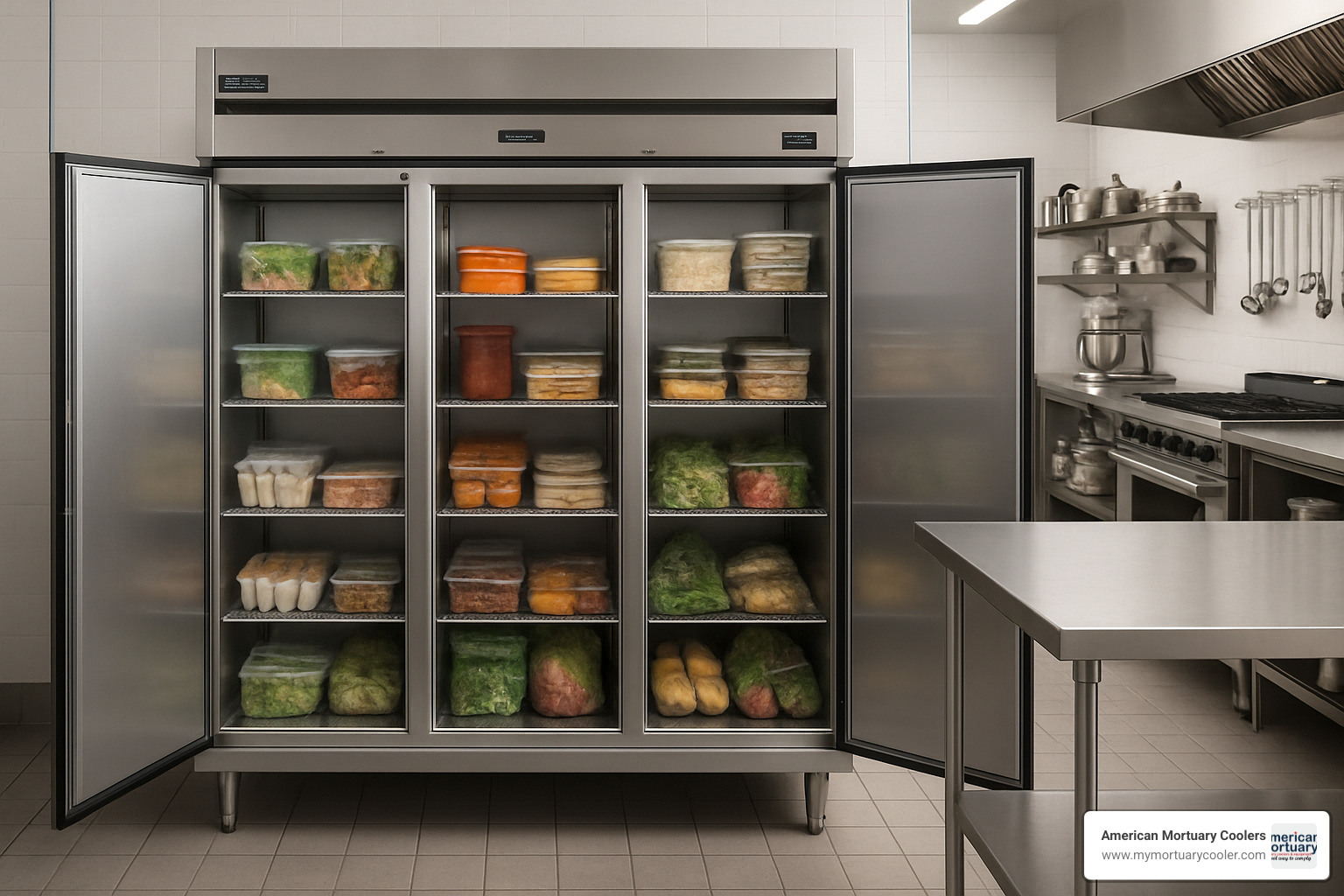
Brand-by-Brand Snapshot
True T-72F-HC: 7-year warranty on parts, labor, and compressor; 72 cubic feet; temperatures to -10°F; Ecomate insulation; $8,500-$10,000
Migali C-3FB-HC: Variable fan system for better humidity management; 40% energy savings from R290 refrigerant; $7,500-$9,000
Hoshizaki F3A-FS Steelheart: 79 cubic feet capacity; temperature range -10°F to +12°F; ducted air distribution; $9,000-$11,000
Maxx Cold MXM3-72FBHC: Budget-friendly with integrated condensate evaporator; $5,900-$7,000
Chef AAA T83F: 12 adjustable wire shelves; recessed door handles; $6,000-$7,500
Refurbished options: Typically 40-50% less than new models ($3,000-$6,000); look for 1-2 year warranties and new OEM compressors
For detailed specifications, you can often Download the Manual directly from the manufacturer's website.
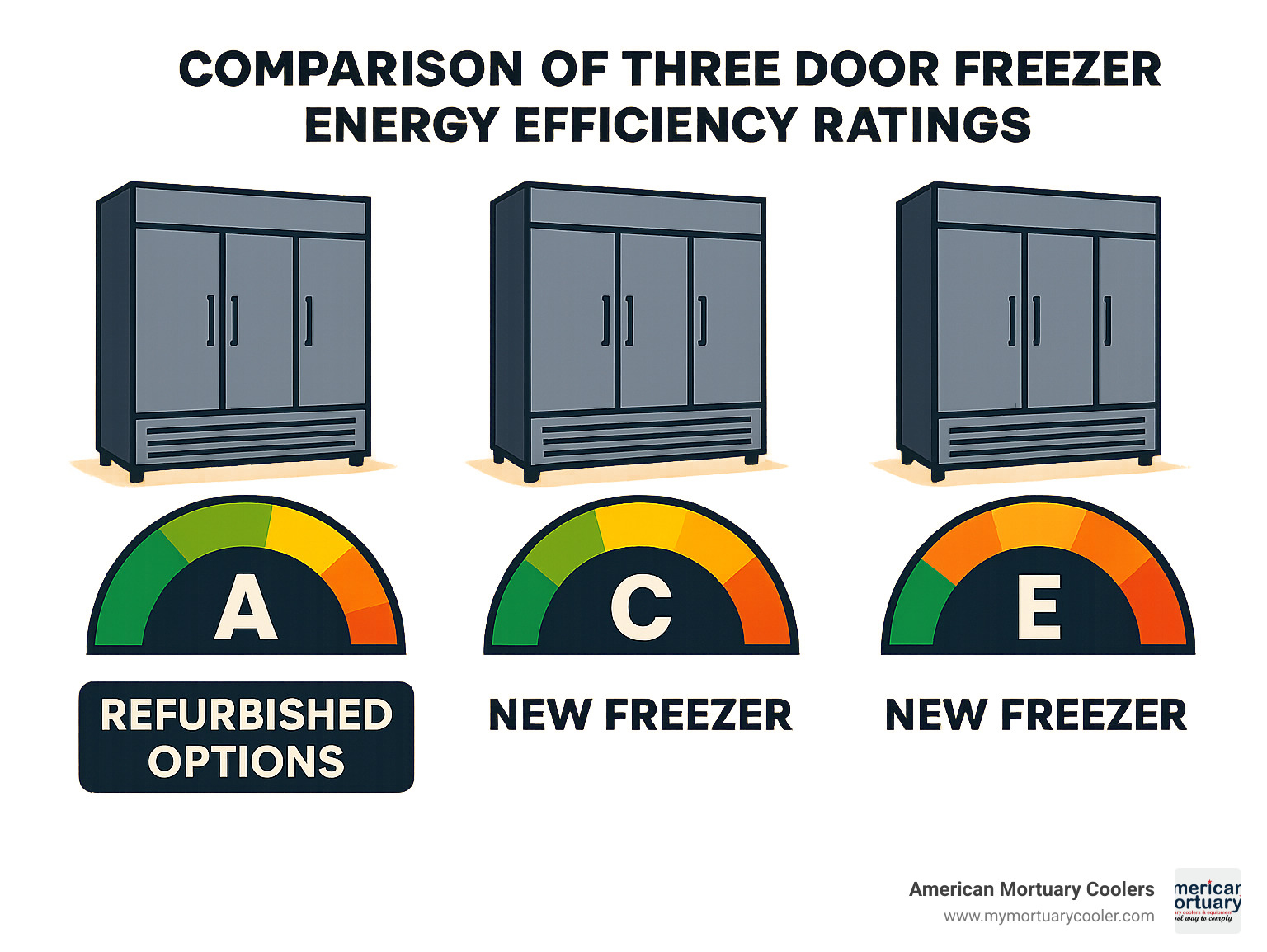
Dimensions, Installation, and Organization Best Practices
Setting up your three door freezer correctly ensures optimal performance and staff efficiency.
Standard Dimensions and Installation Requirements
Most three door freezer models measure approximately:
- Width: 81-83 inches (7 feet)
- Depth: 29-33 inches (2.5-3 feet)
- Height: 79-84 inches (6.5-7 feet)
Proper clearance is crucial:
- Sides: at least 2 inches
- Rear: 3 inches minimum
- Top: 12 inches
- Front: 3-4 feet for door swing and access
Electrical requirements typically include a dedicated 115V/60Hz circuit with 15-20 amps of power, usually with a NEMA 5-20P plug configuration.
Placement considerations:
- Floor must be completely level
- Keep away from heat sources like ovens and dishwashers
- Ensure adequate ventilation
- Consider using non-slip flooring in front for safety
How to Organize a Three Door Freezer for Maximum Efficiency
A well-organized freezer improves efficiency and food safety:
- Position shelves with 6-8 inches between levels for standard items
- Maintain at least 6 inches clearance from the floor (health code requirement)
- Keep 2-3 inches between products and walls for air circulation
Consider a zone-based approach:
- Door 1 (left): Raw proteins and high-turnover items
- Door 2 (middle): Prepared foods and par-cooked items
- Door 3 (right): Specialty items, desserts, and lower turnover products
Implement FIFO (First In, First Out) by placing newer products at the back and older products at the front. Use clear, freezer-safe labels with product names and dates.
For workflow efficiency:
- Place frequently used items at waist height
- Group similar items together
- Distribute weight evenly across shelves
For specialized storage solutions, check out our Ultimate Guide to the Best Cooler Rack Options.
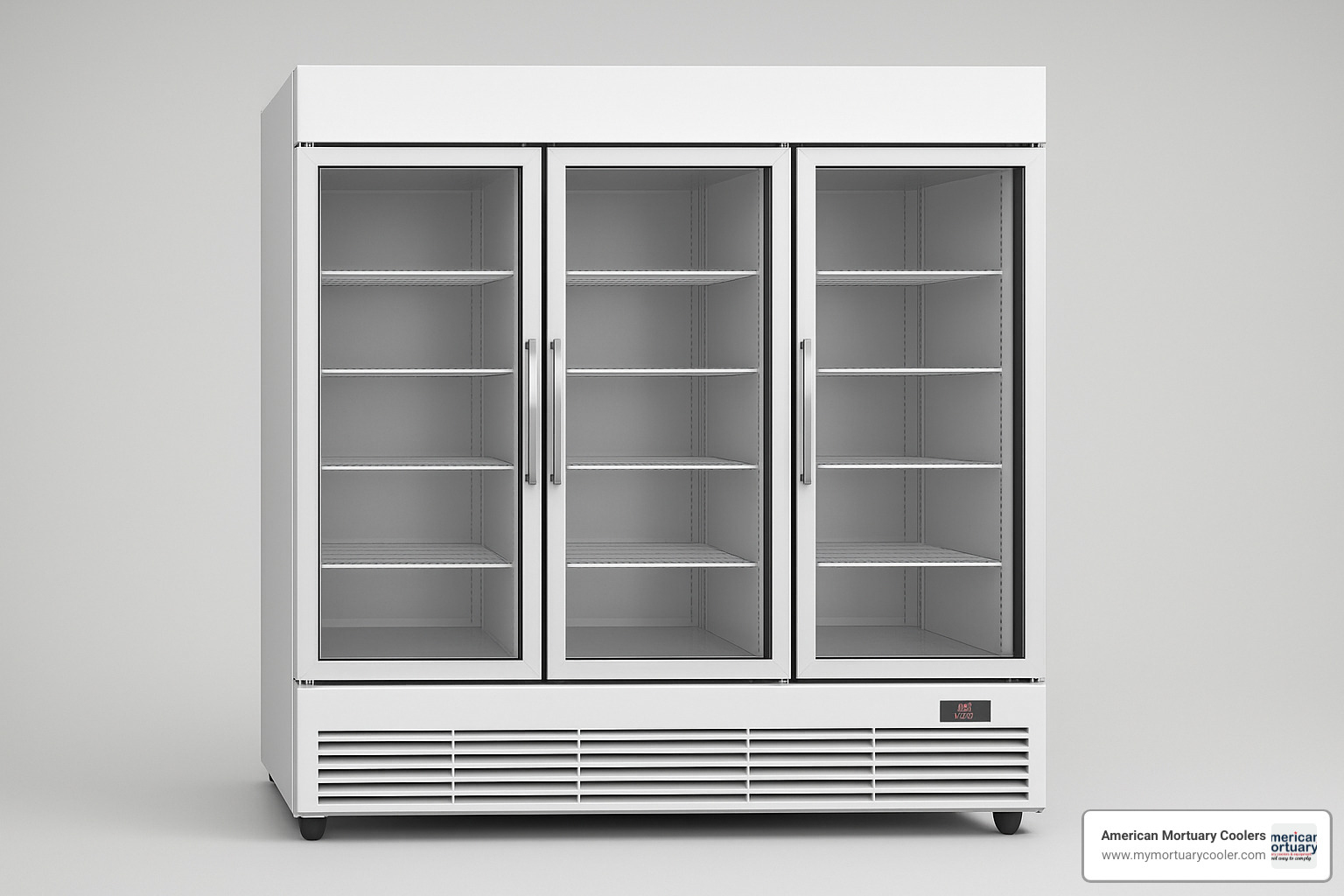
Glass Door vs Solid Door Three Door Freezer
Glass doors offer:
- Visibility without opening the unit
- Reduced door-opening time and frequency
- Better inventory management at a glance
- Merchandising capabilities in retail settings
However, they also have drawbacks:
- 10-15% higher energy consumption
- More prone to condensation and frost issues
- Higher initial cost
- More fragile and require frequent cleaning
Solid doors provide:
- Superior insulation and energy efficiency
- Lower upfront cost
- Better durability in busy kitchens
- Fewer condensation issues
- Better temperature stability
The downside is you'll need to open the door to see what's inside.
Glass door models work best in retail environments and customer-facing areas, while solid door freezers excel in back-of-house kitchen storage and specialized applications.
Maintenance, Cleaning, and Common Troubleshooting
Proper maintenance of your three door freezer protects your investment and ensures food safety.
Routine Maintenance Schedule
Daily:
- Wipe door handles and gaskets with sanitizing solution
- Check temperature display (-10°F to 0°F)
- Clean up any spills immediately
Weekly:
- Clean interior surfaces with non-abrasive cleaner
- Inspect door gaskets for damage
- Check shelving for ice buildup
Monthly:
- Clean door tracks and hinges
- Tighten any loose hardware
- Ensure drain lines are flowing freely
- Verify doors close properly
Quarterly:
- Clean condenser coils (monthly in dusty environments)
- Check fan motors for smooth operation
- Inspect refrigerant lines for wear
Annually:
- Professional technician checkup
- Refrigerant level check
- Compressor performance test
- Control calibration
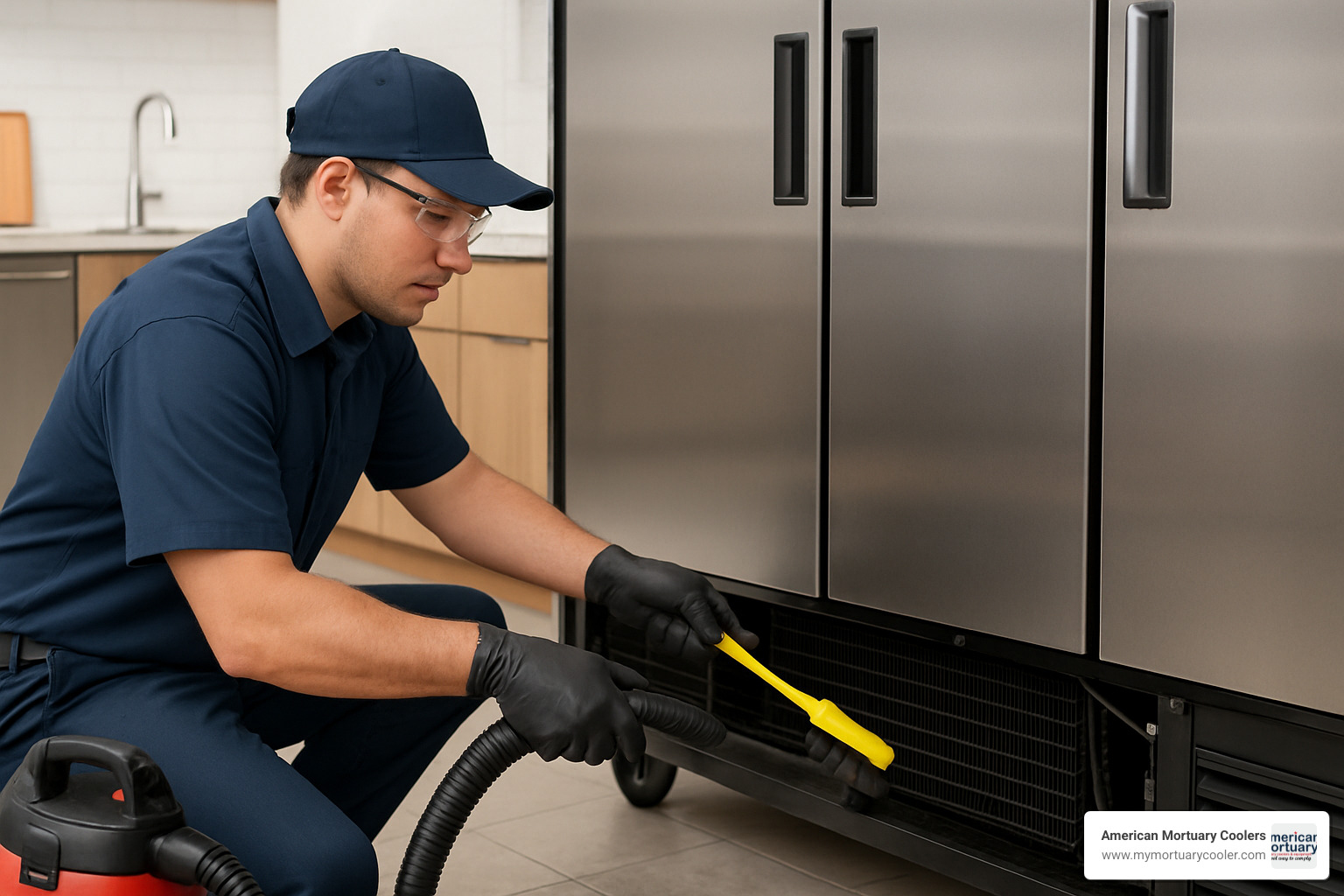
Preventing Frost and Ice Build-Up in a Three Door Freezer
Frost and ice reduce efficiency and storage space. Prevention strategies include:
- Door gaskets: Check weekly for tears or cracks; clean regularly
- Heater wires: Ensure door frame heaters are functioning
- Environmental control: Consider a dehumidifier in humid conditions
- Accessories: Use strip curtains to keep cold air in when doors open
- Defrost cycles: Adjust based on your kitchen environment
- Pressure relief ports: Keep these clear to prevent vacuum issues
For more detailed guidance, visit walkincoolerparts.com for excellent resources.
Quick-Fix Checklist for Service Calls
Before calling for service, check these common issues:
Temperature problems:
- Ensure doors are fully closed and gaskets are sealing
- Check if the unit is in a defrost cycle
- Verify products aren't blocking air vents
- Inspect condenser coils for dust buildup
- Check ambient kitchen temperature (should be below 100°F)
Unusual noises:
- Rule out objects vibrating against the unit
- Verify the freezer is level
- Check that fan blades spin freely
- Call for service immediately for grinding or knocking sounds
Door sealing issues:
- Clean gaskets and door surfaces
- Remove any food debris preventing closure
- Check hinges for proper alignment
Water leakage:
- Verify the unit is level
- Check that drain lines are clear
- Ensure the condensate evaporator pan is intact
Common error codes:
- E1: Temperature sensor failure
- E2: Defrost sensor issue
- E3: Door switch problems
- E4: High pressure
- E5: Low pressure
DIY cleaning and basic adjustments are fine, but leave refrigerant, electrical components, and compressor issues to professionals.
Purchasing, Compliance & Warranty Checklist (Plus Conclusion)
Pricing and Financing Considerations
New three door freezers typically range from $5,000 to $12,000, with premium brands at the higher end. Quality refurbished units can be found for $3,000-$6,000 from reputable dealers.
Financing options include:
- Equipment loans with fixed monthly payments
- Leasing arrangements with 2-5 year terms
- Manufacturer financing programs
When calculating total cost of ownership, factor in:
- Installation ($200-$500)
- Annual energy costs ($800-$1,200)
- Expected maintenance ($300-$500 yearly)
A quality three door freezer should provide 10-15 years of service with proper maintenance.
Compliance and Certification Requirements
Verify that your chosen freezer meets these standards:
- NSF/ANSI 7 certification for food safety
- UL or ETL listing for electrical safety
- Energy Star certification for efficiency (optional but beneficial)
- ADA compliance if required for your establishment
- Prop 65 warnings for California businesses
R290 (propane) refrigerant is now the gold standard, offering environmental benefits and up to 40% energy savings.
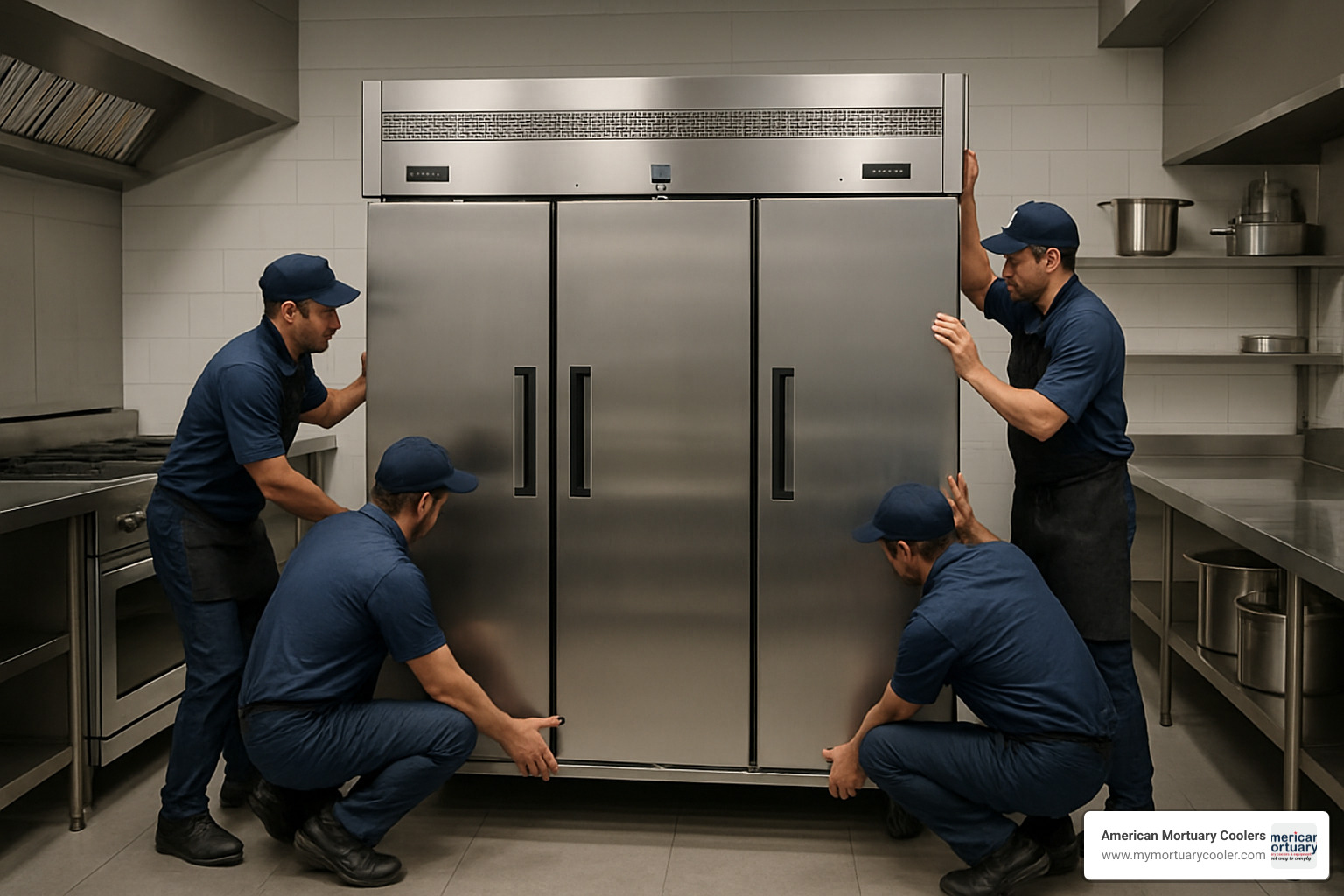
Warranty and Service Considerations
Industry standard coverage typically includes 1 year on parts and labor with 5 years on the compressor. Premium brands often extend this to 2-3 years parts and labor with 7-10 years on the compressor.
Key warranty factors to consider:
- On-site service vs. parts-only coverage
- Registration requirements (usually within 30 days)
- Local service availability for your chosen brand
- Parts availability for your model
Service contracts range from $500-$1,000 annually for preventive maintenance to $1,000-$2,000 for comprehensive coverage.
Environmental and Sustainability Factors
Today's best three door freezers balance performance with environmental responsibility through:
- Energy-efficient R290 refrigerant
- Digital controllers with smart defrost cycles
- LED lighting
- CFC-free polyurethane foam insulation (2-2.5 inches thick)
For more guidance on selecting the right refrigeration partner, see our Ultimate Checklist for Choosing a Walk-In Freezer Supplier.
Final Thoughts & Next Steps
Choosing the right three door freezer means finding the balance between upfront cost and long-term value. Focus on quality construction, energy efficiency, warranty coverage, and appropriate capacity for both current and future needs.
At American Mortuary Coolers, we understand that refrigeration needs extend beyond traditional foodservice applications. Our expertise includes both standard commercial settings and specialized applications like mortuary storage, where temperature control is absolutely critical.
We deliver directly across all 48 contiguous states and can help you select the perfect three door freezer for your specific needs.
For more information about our custom refrigeration solutions, visit American Mortuary Coolers – Leading Supplier.
With the right three door freezer and proper maintenance, you'll enjoy years of reliable service, energy efficiency, and precise temperature control.



















